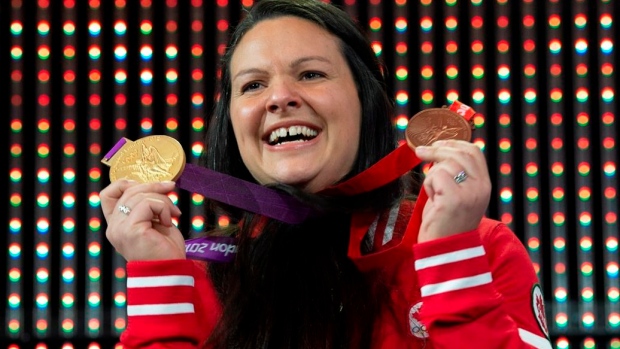Dec 3, 2018
Christine Girard finally receives Olympic medals
Canadian weightlifter Christine Girard received her London 2012 Olympic gold and Beijing 2008 Olympic bronze medals in a ceremony held today at the National Arts Centre in Ottawa.
The Canadian Press

OTTAWA — Christine Girard called it a victory for clean sport.
The 33-year-old received her London 2012 Olympic gold and Beijing 2008 Olympic bronze medals on Monday in a much-anticipated ceremony for the now-retired weightlifter.
"I've been waiting for this moment for a long time," said an emotional Girard to the crowd gathered at the National Arts Centre. "There's just so much emotion. I'm just so proud to be able to be here today to receive this, not only in my name, but for my family, my friends that supported me, for Canada."
Girard learned in 2016 she would be upgraded to gold medal for the 63-kilogram event in London after Maiya Maneza of Kazakhstan and Svetlana Tsarukaeva of Russia were stripped of their medals. A retest of their urine samples had tested positive for a banned substance.
The feeling of winning bronze is still a point of pride for Girard, despite now knowing she could have been on the top of the podium, as she became the first Canadian woman to medal in weightlifting.
"I grew up believing that it wasn't possible for a female in Canada to win an Olympic medal in my sport," Girard said. "For me to do that it was proving to that little girl that she wasn't right to not believe. It was such an important moment for me."
Earlier in 2016, Girard was told awarded the bronze medal from the Beijing 2008 Games after silver medallist, Irina Mekrassova of Kazakhstan, failed a retest.
Girard hasn't spoken to the competitors who had their medals stripped, but she says holds no ill will against them.
"I've spoken to other athletes who were caught and I don't necessarily believe it's their choice (to use illegal substances)," Girard said. "It's often those around them. Their trainers, those responsible for the sport, it's really out of their control. Some were forced to use illegal substances.
"I'm extremely proud to be Canadian and live in a country that doesn't condone that. I'm not mad at those women (who cheated). I'm just very disappointed that they had to grow up in a country that's so different."
While Girard is pleased the record has been set straight, she says she wonders how different things could have been had she received her proper medals at the Games.
"My four years between 2008 and 2012 were very difficult," Girard said. "I trained in a carport that was barely heated. I went through a bit of depression; I was burnt out and went through five different trainers. Things really weren't going well. It was a really difficult time.
"If I had those medals on time I would have had a different life, that is for sure. Now I have the chance to go out there and tell my story it's worth it to believe, it's worth it to do it the right way."
Girard will be awarded $10,000 from the Canadian Olympic Committee for winning gold in addition to the $10,000 she received in 2012. What she won't get back is the potential endorsement and sponsorship money she likely would have received had she been awarded the medals at the Games.
"You can't help but wonder how different her career post-Games would have gone," said Jeane Lassen, a member of Girard's coaching team in London and former teammate. "Christine is the most adaptable, resilient athlete there is and she will take this unfortunate turn of events that she wasn't able to the gold medallist on the day of her competition and use this as a platform for drug-free sport."
Girard and her young family — including her three children, four-year-old Philip, two-year-old Aliana and nine-month-old Samuel — recently moved to Gatineau, Que., and she hopes to work with a local gym and its young athletes. She has also been an advocate for clean sport and attends a number of symposiums with a focus on working towards a drug-free sport environment.
Girard joins Dylan Armstrong (athletics, Beijing 2008) and Beckie Scott (cross-country skiing, Salt Lake City 2002) as Canadian Olympians to receive medal reallocations due to doping violations.
